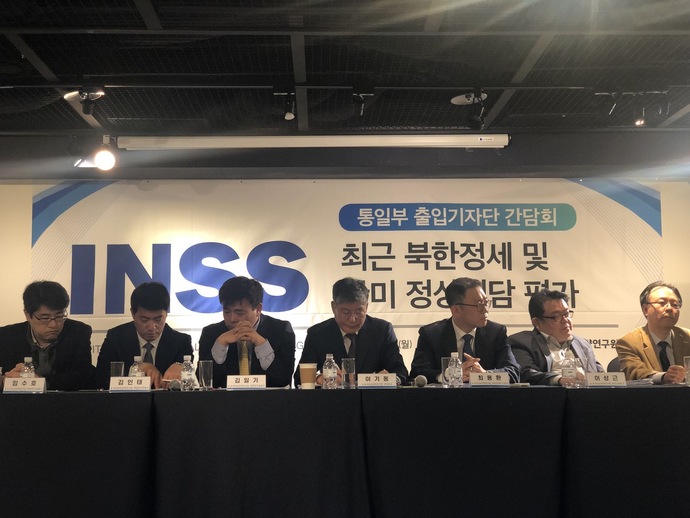 |
|
The Institute for National Security Strategy holds a press conference in Seoul on Apr. 15. (Noh Ji-won, staff reporter)
|
National security experts say North is proposing the disposal of unilateral preconditions
North Korean leader Kim Jong-un’s Apr. 13 policy speech at the inaugural meeting of the 14th Supreme People’s Assembly (SPA) showed “the potential for an avenue away from demands for corresponding measures centering on sanctions relief” in Pyongyang’s talks with Washington, an Institute for National Security Strategy (INSS) analysis concluded. On Apr. 15, the state-funded think tank held a talk with reporters at the Sejong Center in Seoul’s Jongno district on the topic “The Recent North Korean Situation and an Assessment of the North Korea-US Summit.” During the talk, Kim Il-ki, who heads INSS’ North Korea research division, noted that Kim Jong-un’s policy speech “made reference to the need for both sides to set aside their unilateral preconditions and work to come up with constructive solutions that accord with each of their interests.” “This implies a possibility to get away from demands for corresponding measures centering on sanctions relief,” he suggested. An explanation was also offered to Kim’s remarks in the policy speech insisting that the South Korean government “be an interested party that defends the [Korean] people’s interests rather than acting as meddling mediators or catalysts.” INSS Vice Director Lee Ki-dong said, “Some are claiming that this was a denunciation of the president and suggesting that a summit might be difficult, but that is reading too much into things.” “He seemed to be urging [the South Korean government] to approach things from a stakeholder’s perspective even as it adopts the role of proactive mediator and catalyst,” Lee suggested. Questions were raised during the talk about whether the Committee for the Peaceful Reunification of the Fatherland (CRPF), North Korea’s organization for South Korean affairs, was incorporated into the State Affairs Commission during the inaugural meeting of the 14th SPA. “No official announcement has been made, so there is only speculation,” said Kim In-tae, a senior research fellow at INSS. “The State Affairs Commission unquestionably came out stronger from the Supreme People’s Assembly meeting,” Kim added. “We believe [some of the] important agencies were incorporated into the State Affairs Commission, including the Committee for the Peaceful Reunification of the Fatherland.” Potential North Korea-Russia summit Analyses were also offered on the possibility of a North Korea-Russia summit taking place in late April or early May. Jang Se-ho, an associate research fellow in INSS’ external strategy research division, predicted a “strong chance a North Korea-Russia summit will be held late this month or in early May.” “My understanding is that Russia has actively suggested holding summit as the two sides mark the 70th anniversary of their diplomatic relationship,” Jang said. “[Russia] has explored the possibility of holding summits in April/May, September, and November, and actual senior-level visits have taken place between the two sides,” he noted. “At the same time, [the summit issue] has been shifted down on the priority list because of the urgent scheduling with North Korea-US talks and discussions with China,” Jang explained. “This will be the time for holding the postponed North Korea-Russia summit,” he predicted. By Noh Ji-won, staff reporter Please direct comments or questions to [english@hani.co.kr]






